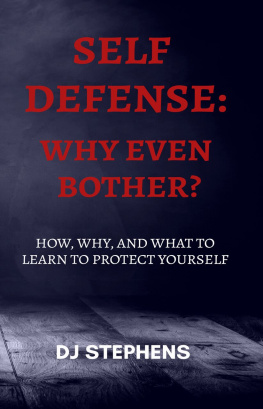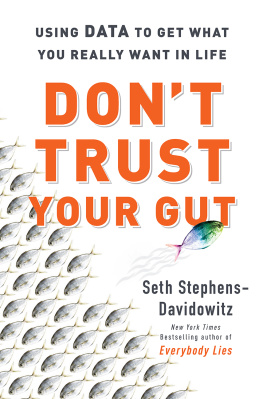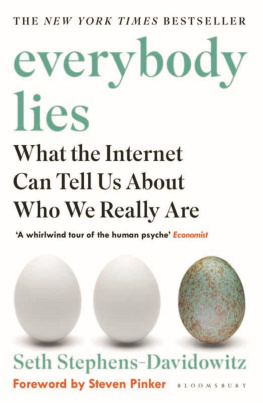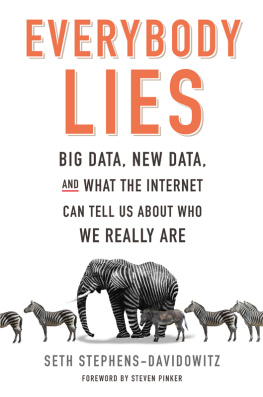Conversation Starters
for
Seth Stephens-Davidowitzs
Everybody Lies
By dailyBooks
Please Note: This is an unofficial conversation starters guide. If you have not yet read the original work, please do so first.
Copyright 2017 by dailyBooks. All Rights Reserved.
First Published in the United States of America 2017
We hope you enjoy this complementary guide from dailyBooks . We aim to provide quality, thought provoking material to assist in your discovery and discussions on some of todays favorite books.
Disclaimer / Terms of Use: Product names, logos, brands, and other trademarks featured or referred to within this publication are the property of their respective trademark holders and are not affiliated with dailyBooks. The publisher and author make no representations or warranties with respect to the accuracy or completeness of these contents and disclaim all warranties such as warranties of fitness for a particular purpose. This guide is unofficial and unauthorized. It is not authorized, approved, licensed, or endorsed by the original book's author or publisher and any of their licensees or affiliates.
No part of this publication may be reproduced or retransmitted, electronic or mechanical, without the written permission of the publisher.
Tips for Using dailyBooks Conversation Starters:
EVERY GOOD BOOK CONTAINS A WORLD FAR DEEPER THAN the surface of its pages. The characters and their world come alive through the words on the pages, yet the characters and its world still live on. Questions herein are designed to bring us beneath the surface of the page and invite us into the world that lives on. These questions can be used to:
- Foster a deeper understanding of the book
- Promote an atmosphere of discussion for groups
- Assist in the study of the book, either individually or corporately
- Explore unseen realms of the book as never seen before
About Us:
THROUGH YEARS OF EXPERIENCE AND FIELD EXPERTISE, from newspaper featured book clubs to local library chapters, dailyBooks can bring your book discussion to life. Host your book party as we discuss some of todays most widely read books.
Table of Contents
Introducing Everybody Lies
T O WRITE HIS BOOK, EVERYBODY LIES: WHAT THE INTERNET Can Tell Us About Who We Really Are , Seth Stephens-Davidowitz analyzed internet searches that people entered into Google. He discovered that everybody is lying in order to look good. People often do not even reveal the behaviors they deem embarrassing in anonymous surveys in an effort to look good. People also lie about their lives on social media. Stephens-Davidowitz found that people used the words "the best," "the greatest," and "my best friend" to describe their husbands on social media. However, the words "a jerk," "annoying," and "mean" were used to describe husbands in Google searches. This is called the social desirability bias.
Research shows that social desirability bias has been around for many years. In a 1950 study, researchers were able to gather data on how many people in Denver had a library card, voted, and gave to charity. Then, they gave a survey to the people of Denver, asking the same questions, to see whether or not the data would match with the survey. The results showed that more people reported voting, giving to charity, and owning a library card than the official data showed. More recently, the University of Maryland conducted a study that asked people about their experience in College. They found that less than 2% of the graduates reported graduating with a GPA lower than 2.5, but actual data showed that 11% of them did.
When people are alone, they are more likely to reveal the truth. This is why internet surveys are more accurate than phone surveys or in-person surveys. This is why looking at Google searches is a good indicator of the true feelings and thoughts people have. In his research, Stephens-Davidowitz was able to find out many truths about abortion, religion, sexuality, health, and mental illness. He believes that the data on Google searches is the most important data that has been collected on humans.
When it comes to homosexuality, it was long believed that around 10% of men in America were gay, according to Alfred Kinsey. Today, according to surveys, around 2% to 3% of American men are gay. However, this subject is often one where people feel they cannot be honest. Stephens-Davidowitz offers insight into this topic. He says that honesty about homosexuality may depend on where people live in the United States. A Gallup survey shows that the number of gay people in Rhode Island is twice as high as the number of gay people in Mississippi. Rhode Island is the stat that has the most support for gay marriage, while Mississippi has the lowest. Stephens-Davidowitz theorizes that gay men who are born in states that are less tolerant may move to states that are more tolerant. In addition, gay men living in states that are not as tolerant may not reveal that they are gay. These number can also be mirrored on Facebook where people can indicate which gender they are interested in. By looking at Facebook, Stephens-Davidowitz was able to find data that suggests gay men born in intolerant states do often move to a state that is more open-minded. When looking at data from Google searches, Stephens-Davidowitz concludes that roughly 5% of men are gay, bisexual, or questioning their sexuality.
In an interesting study, Stephens-Davidowitz found that women suspect that their husbands are gay quite often. To complete the phrase "Is my husband...," women are 10% more likely to search for "Is my husband gay?" on Google than the second highest search, "Is my husband cheating? The third and fourth place searches are "Is my husband an alcoholic?" and "Is my husband depressed?" Stephens-Davidowitz also found women are far more likely to question the sexuality of their husbands in states where people are less tolerant towards homosexuality. South Carolina and Louisiana were the two highest states where women question the sexuality of their husbands, and the majority of the states in which the search was most common were states that showed low support for gay marriage.
In regards to body image, women are more concerned about their appearance. However, the difference in men and women who are concerned about appearance does not slant as far toward women as stereotypes suggest. 42% of men search for beauty and fitness, 33% of men search for how to lose weight, and 39% of men search for cosmetic surgery.
When looking at race and religion, Stephens-Davidowitz found that people are more prejudiced than they would reveal in public. Research shows that people who are African American are often stereotyped as "rude." In fact, they are the only group that are stereotyped as rude. Jews and Muslims are the only people that are not stereotyped as "stupid," but they do face the stereotype "evil." Gay people are also stereotyped as "evil." Muslims are often stereotyped as "terrorists." When someone who is Muslim is involved in a terrorist attack, people are instantly against all Muslims. For example, when a mass shooting happened in California by two Muslims, people living in California decided quickly that they wanted to kill Muslims, according to their Google searches following the attacks. Astonishingly, "kill Muslims" is searched as often as "migraine symptoms" and "martini recipe" in America. When President Obama gave a speech against Islamophobia, Google search results soared referring to Muslims and Syrian refugees as bad, violent, evil, and terrorists.
Next page






















